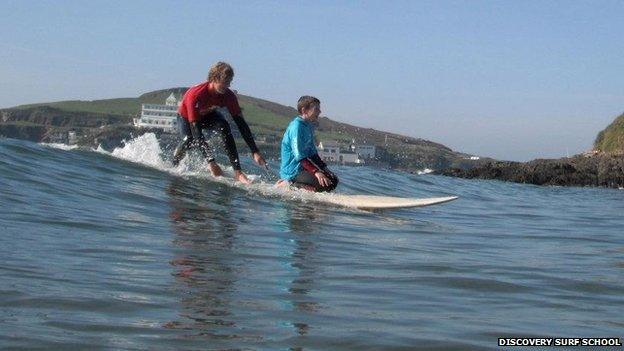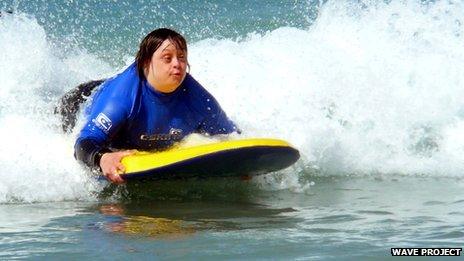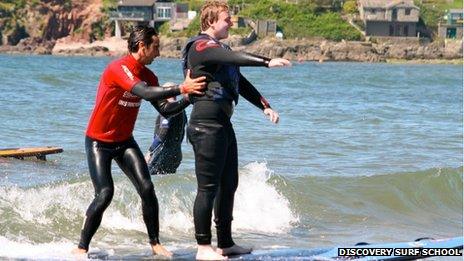Is surfing therapy for disabled?
- Published

Surfing has given Archie Pollock, who has autism, a new lease of life
<bold>Surfing is being touted as therapy for people with disabilities, but those behind the claims must prove their case.</bold>
Thirteen-year-old Archie Pollock has severe autism, which means he can barely speak or write and has what his mother Christianne calls "challenging behaviour".
He does not like queuing, or standing still at all, he refused to eat meat, fish or vegetables for years and he likes to go up to people and sniff them.
He cannot be left on his own.
Two years ago a friend told Mrs Pollock from Plymouth about surfing courses for disabled children at the Discovery Surf School in nearby Bigbury, Devon. She took her son along, fearing the worst.
"I thought there was no way we'd ever even get him into a wetsuit," she said. "Tight fitting clothes were a no-no."
But after a bit of convincing about the need to get kitted out appropriately for British waters, Archie went surfing and he and his family have never looked back.
Most tellingly, his weekly surfing sessions leave him more relaxed and more at ease with other people.
Mrs Pollock said: "Before surfing, finding things for him to do was very difficult.

More than 40 competitors were at Fistral in Newquay for what is believed to have been the UK's first surfing contest for people with learning disabilities
"The school holidays would be six weeks of horror.
"I could never think of anywhere to take him and we'd end up driving around in the car or something.
"But surfing has been an absolute godsend.
"Last year he would be surfing in all his spare time. He was relaxed and we were relaxed. It was the first holiday we had really enjoyed."
Archie is among many people who appear to benefit from the effects of sliding down the face of a few waves.
Several years ago, armed forces personnel suffering from post traumatic stress syndrome (PTSD) claimed surfing had given them some relief from their condition.
Several surf schools are now taking children with autism, cerebral palsy and Down's syndrome.
Discovery is developing what is thought to be the first course of its kind for instructors teaching disabled children to surf.
And the surf school, along with Devon-based charity Lifeworks, are holding a free day of surfing called Breaking the Barrier for disabled children on 1 July.
Mrs Pollock believes it is being exposed to wind and waves that helps Archie.
She said: "He likes the elements. He is quite sensory seeking and I imagine surfing provides a lot of that."
Dr Mathew White, senior research fellow at the European Centre for the Environment and Human Health (ECEHH) in Truro said a lot of the evidence of the benefits of surfing was "anecdotal".
'Positive changes'
He said: "Is it being in the water, is it the physical activity, is it the quality of the coaches, is it any better than art therapy, horse riding or sitting at home watching England beat Ukraine while drinking a beer?
"We simply don't know as no control study has been carried out."

Devon-based surf school Discovery is hoping to start courses for instructors teaching disabled people how to surf
ECEHH has worked with Cornwall-based surf firm Global Boarders, which takes children who have been excluded from school.
Dr White said it had brought about "positive changes" in the attitudes and behaviour of the children.
He said: "We have a number of ideas why this might be but it's no quick fix, magic bullet.
"It may depend largely on the professionalism and dedication of those delivering the program and it is not going to work for everyone.
"As a keen but poor surfer myself I can see where the benefits may lie but... we shouldn't confuse hunches with evidence."
Last week more than 40 competitors were at Fistral beach in Newquay for what is believed to have been the first <link> <caption>surfing contest for people with learning disabilities</caption> <url href="http://surfinggb.com/2012/06/26/learning-disability-surf-challenge/" platform="highweb"/> </link> .
Contest organiser Wave Project conducted a six week NHS-funded project in 2010 to analyse the effect of surfing on people with mental health difficulties.
The report concluded that at a cost of £49 per person per lesson, surfing "will provide a positive social return on investment" but more research was needed.
The Wave Project is now hoping to get NHS funding for a research assistant to analyse the long-term benefits.
Wave Project co-ordinator Joe Taylor said: "It's difficult to justify when people are losing their jobs but if it saves money in the long run by reducing the cost of mental health treatments, it's worth the money."
For Christianne Pollock there is no doubt.
"After years of activities lasting minutes at most, seeing Archie find something that he'll happily do for hours still makes me emotional when I think about it," she said.
"And there's something about seeing these kids so free and utterly stoked that is very moving."
- Published22 June 2012
- Published19 August 2010